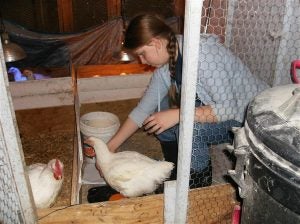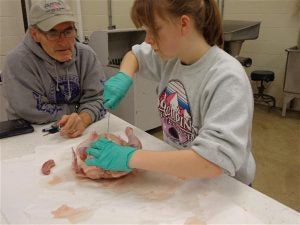Chrysta Beck didn’t grow up on a farm, but it was through 4-H, the 2017 National FFA American Star in Agriscience winner first developed a passion for poultry.
During elementary school, the Archbold, Ohio, native started out raising a flock of 30 broilers for the fair. Each year, the number of birds under her wing continued to increase. Meat and egg production soon became Beck’s main Supervised Agriculture Experience projects for FFA. And by the time the young entrepreneur was in high school, she was running a fully functional small business raising more than 600 broilers and producing 200 dozen eggs a year.
In the beginning, Beck’s Agriscience SAEs for the Pettisville FFA Chapter were based largely around her personal business, conducting research that observed the effects of environmental factors such as light, color, and temperature on broiler growth and feed conversion. But by her junior and senior year of high school, Beck broadened her interest to commercial broiler production in the United States.

“My interest in looking at antibiotic alternatives, specifically coccidiostat alternatives, stemmed from articles I found about the growing consumer demand for antibiotic-free production,” Beck said.
That interest led her to Mississippi State University, where she had the opportunity to research the viability of an “in egg” probiotic injection practice in fertile broiler hatching eggs as an antibiotic alternative. While the research conducted was not for a class credit, the work earned Beck the prestigious National FFA American Star in Agriscience honor this year as well as garnered much interest from the poultry industry.
The injection of probiotics into fertile hatching eggs has not been applied to commercial production at this point, but Beck said there is hope that it will be a viable option for commercial hatcheries in the future.
“In terms of probiotics, the industry has been willing to use these alternatives,” Beck said. “As the poultry industry continues to feel a demand for antibiotic-free production, they are actively searching for alternatives that work just as well as antibiotics in preventing and treating disease.”

Now a senior at Mississippi State University, Beck plans to stay on after graduation to pursue a Master of Science degree in Agriculture with a Poultry Science Concentration. After that, she hopes to attend vet school and continue research as an avian medicine veterinarian.
“Research is a critical part of the livestock and poultry industry because it is what has allowed animal agriculture to develop substantially in the past 50 years,” Beck said. “Without research in genetics, nutrition, and disease, the poultry industry would not have such a large understanding of how a bird functions. Research will always crucial because there will always be new problems in the industry that need to be studied.”
That’s why Beck encourages FFA students to take a shot at an Agriscience SAE.
“I would encourage FFA students to participate in at least one Agriscience SAE. It is an interesting experience that builds many different skill sets such as leadership, critical thinking, and public speaking,” Beck said. “Research will always be challenging (and frustrating), but don’t be discouraged when your data doesn’t tell you what you thought it would. Wrong answers always lead to new and improved questions.”



